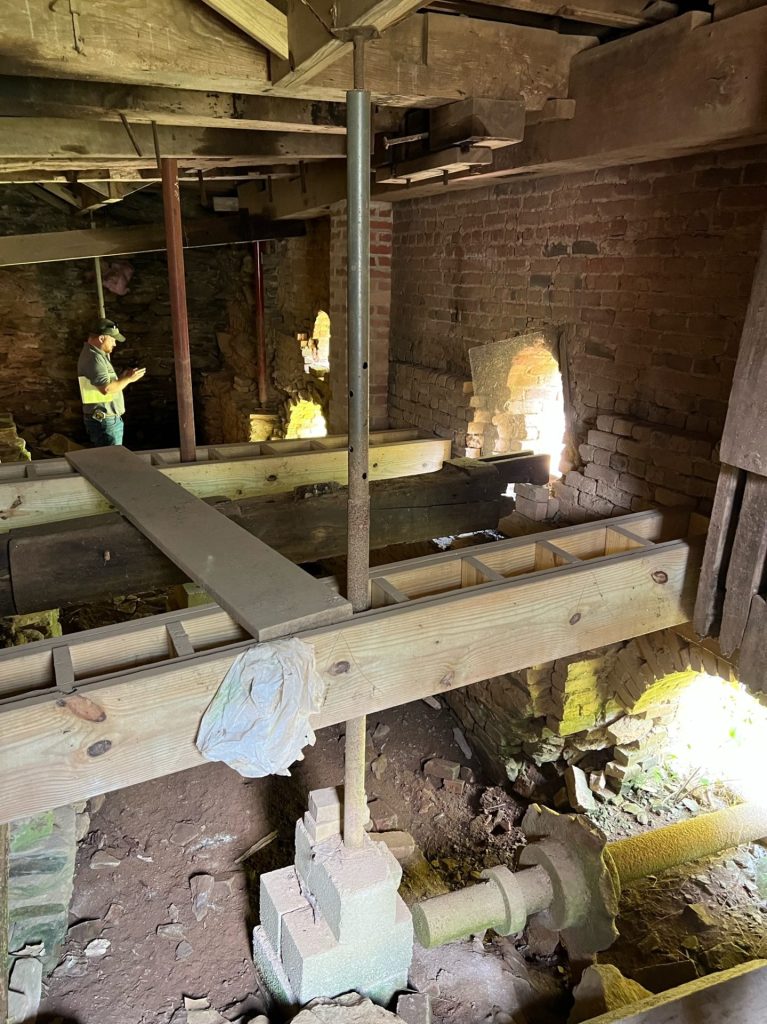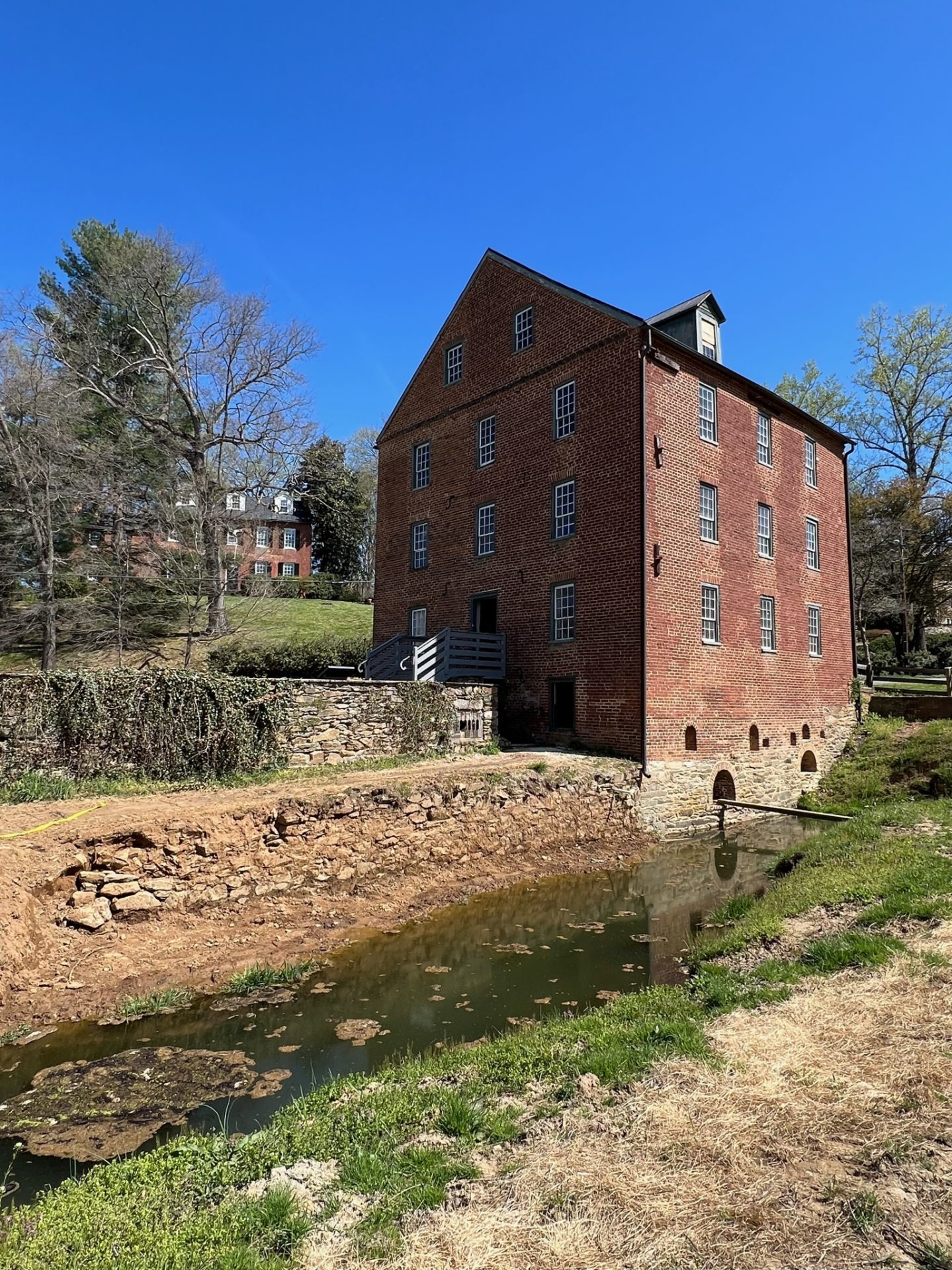For Carpenter Beach Construction, restoring the historic Waterford Mill in northwest Loudoun County wasn’t just a job. It was a labor of love.

The Leesburg-based company is owned by two Western Loudoun natives, Charlie Beach and Scott Carpenter. Their firm was selected by the Waterford Foundation and Loudoun County for a $1.6 million project to restore and stabilize the historic Waterford Mill, a crown jewel of the historic 18th-century village. The project, completed in July 2023, is a dream come true for the foundation, which has owned the structure for nearly a century and wants to keep it open to visitors for years to come.
Since the Waterford Foundation uses the mill to host visitors and events, the priority was ensuring stability and accessibility, shoring up structural elements that had been in disrepair for years. The project brought unique challenges and exciting possibilities for Carpenter Beach, who worked on this with the Richmond-based architecture firm Glave & Holmes.
As visitors arrive in Waterford from the north, the historic mill is their first landmark, a charming reminder of the tiny village’s days as a thriving commercial hub. The wheat mill, built in 1818, was at the heart of Waterford’s role as a regional trade center, shipping flour around the young nation and the world. The mill closed in 1938 and has been managed by the nonprofit Waterford Foundation for nearly a century. Over the decades, it has undergone several renovations, including removing most of the milling equipment. In the early 2000s, foundation leaders determined that a restoration and stabilization project was needed and embarked on a decades-long effort to secure funding for and complete the project. When Loudoun County agreed to fund the project, Leesburg-based Carpenter Beach, one of the region’s top historic restoration specialists, won the bid.
The nine-month project included restoring the mill’s historic Hurst frame, repairing windows and flooring, making structural improvements, painting, doing interior and exterior masonry work, excavating and repairing the water wheel pit, and adding accessibility features.
“It’s always cool to do a project in your backyard,” said Ben Carpenter, a second-generation historic restoration specialist at the company. Carpenter Beach co-owner Charlie Beach grew up in Waterford and is raising his family there. The project was also especially meaningful for Beach, who has been actively involved in preservation efforts in the village for decades.
Like many longtime Loudouners, Ben Carpenter remembers attending the Waterford Fair as a kid and having fun field trips to the village’s Second Street School. The Waterford Foundation’s educational programming allows contemporary kids to assume the roles of 19th-century students–a rite of passage for Loudoun elementary school students studying Virginia history.
“We were excited to win the bid for the mill project and were intent on doing it right,” Carpenter said.
As with every historic restoration project, Carpenter Beach’s approach to the mill restoration involved unique challenges and creative solutions. One of the Waterford Foundation’s primary goals was to restore the mill’s historic timber Hurst frame, a rectangular framework in the building’s stone and brick basement that supported the gears and millstones and prevented damage to the building from the millwork’s vibrations.
For Carpenter Beach, that meant starting from scratch, including harvesting the trees for the wooden frame. The team worked with their sister company, Local Wood, which specializes in turning hardwood from locally sourced trees and antique lumber into everything from flooring to furniture. In this case, the challenge was sourcing authentic oak beams needed for the mill project.
“That was fairly challenging and a really unique feature…It took us a while to hunt down the trees we needed to harvest,” Carpenter said.
For the mill project, the company sourced oak trees, 30 inches in diameter and 30 feet tall, from a Clarke County farm for authentic and uniform beams.
The Waterford Mill project began with removing flooring and restoring the building’s stone and brick basement, where the Hurst frame is located. It included rebuilding stone walls, painting the roof, and building new floors in the attic. In addition to stabilization efforts, ensuring the authenticity of every detail was also a priority. Carpenter Beach replaced each of the mill’s windows, crafted by hand by a Carpenter Beach craftsperson. A company craftsman also made gorgeous wooden medallions from oak and walnut placed where the millstones would have been. The project’s detailed masonry work was completed by specialists with hand-mixed mortar approved by the architect to match the building’s original lime mortar.
The Waterford Foundation will spotlight the newly restored mill as part of its milestone 80th Waterford Fair, which takes place Oct. 4-6, 2024. Every year, the beloved fair highlights artisans and craftspeople who execute their trades in traditional ways. Carpenter said the mill project’s focus on historically accurate craftsmanship is a perfect match for the Waterford Fair’s vibe.
“The Waterford Fair is all about traditional craftsmanship and trades,” he said. “We used similar techniques to work on the mill like they would have done 200 years ago when it was built.”
The 80th Waterford Fair is Oct. 4-6, 2024
The Waterford Fair is one of the region’s most anticipated events for locals and visitors alike. There’s nothing like enjoying a crisp October day with tours of historic homes and gardens, juried crafters, food and entertainment. This year, the newly restored Waterford Mill will be a star, where visitors can check out renovations while shopping for handcrafted goods from local and nationally noted artisans. This year’s Waterford Fair takes place Friday, Oct. 4 through Sunday, Oct. 6, 2024, from 10 a.m. to 5 p.m. For tickets and information, go to waterfordfairva.org.


